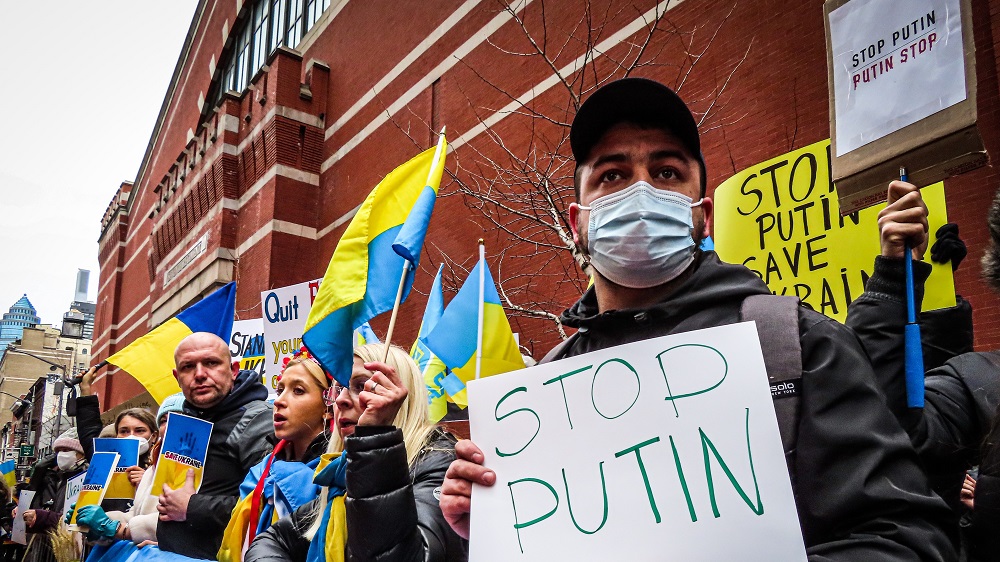The Ukraine crisis — Twitter, YouTube and Facebook respond and Russia sites attacked
Faced with the fast-evolving situation in Ukraine, tech companies have jumped into action

Update: Goggle is pushing out air raid alerts to Ukrainian Android users.
The horrifying situation in Ukraine has been ongoing for three days now, with photos and video broadcast around the world in seconds thanks to the widely spread use of social media in the country.
But while the west grapples with the possibilities of greater sanctions to make the war untenable for Putin and Russia, the response from (and in some cases ‘to’) big tech has had to be more nimble. Here is how the world of tech has reacted to the crisis so far.
Sanctions and SWIFT expulsion
In the last few hours, the EU and US have agreed to remove some Russian banks from the SWIFT secure message network, which is primarily known for its use in financial systems. SWIFT links over 11,000 financial institutions including the likes of the US Federal Reserve and the European Central Bank, so it could have a significant effect on Russia’s economy. You can read the joint statement from the US and European allies here.
Perhaps more importantly, the statement also mentions “restrictive measures that will prevent the Russian Central Bank from deploying its international reserves in ways that undermine the impact of our sanctions.” That, as explained in this Twitter thread by Professor Rob Person, could be devastating to the Russian economy in the long run.
More immediately, though, the SWIFT change has had an instant knock-on effect on the ground to ordinary Russians, with the Central Bank of Russia announcing that customers of affected banks will no longer be able to use Apple Pay or Google Pay services. Though, as The Verge points out, neither service is as popular in Russia as they are in the West: as of 2020, 29% of Russians used Google Pay, and just 20% used Apple Pay.
On top of this, the US is imposing export restrictions to prevent Russian access to tech goods from overseas. American suppliers looking to ship the likes of microelectronics, telecommunications items, sensors, navigation equipment and more to Russia will now need to obtain a licence. License requests will work on a “under a policy of denial” meaning the expectation is that any recuse will be turned down unless there are exceptional circumstances.
Get instant access to breaking news, the hottest reviews, great deals and helpful tips.
“Between our actions and those of our allies and partners, we estimate that we will cut off more than half of Russia's high-tech imports,” President Joe Biden said during a speech explaining the new sanctions.
Notably, these won’t impact the import of smartphones (as long as they’re not to government employees or state owned businesses), and there have been calls for tech companies to boycott Russia in protest. In a letter published on Twitter, Ukraine’s Vice Prime Minister, Mykhailo Fedorov, called on Apple CEO Tim Cook to cease the sale of his company’s products and close the App Store in Russia.
I’ve contacted @tim_cook, Apple's CEO, to block the Apple Store for citizens of the Russian Federation, and to support the package of US government sanctions! If you agree to have the president-killer, then you will have to be satisfied with the only available site Russia 24. pic.twitter.com/b5dm78g2vSFebruary 25, 2022
“The whole world is repelling the aggressor through the imposition of sanctions — the enemy must suffer significant losses... [I]n 2022, modern technology is perhaps the best answer to tanks, multiple rocket launchers and missiles," he wrote.
“We are sure that such actions will motivate youth and active population of Russia to proactively stop the disgraceful military aggression.”
Fedorov confirmed in a series of follow-up tweets that he’d sent similar letters to Google, Netflix, YouTube and Meta.
Federov also sent an open letter to DJI, asking it to create a no-fly zone for Russian-operated drones in Ukraine.
Twitter, YouTube and Meta respond
Speaking of YouTube and Meta, social media companies are deeply aware that their platforms can be used for both misinformation and disinformation. As such, a few companies have made loud proclamations about their crack down of propagandists trying to use such channels to push the Kremlin spin on the war.
Twitter was first out of the blocks, announcing that it had paused adverts in both Ukraine and Russia “to ensure critical public safety information is elevated and ads don’t detract from it.” It is also halting the recommendations feature to try and “reduce the spread of abusive content,” and monitoring high-profile accounts of journalists, activists and government officials to avoid hacking attempts.
YouTube has explained that the “extraordinary circumstances” mean that it has temporarily barred a handful of Russian channels — including Russia Today (RT) — from earning ad revenue. The algorithm has also been tweaked to ensure that videos from these content creators will also appear less frequently in user recommendations.
After the Russian regulator Roskomnadzor pledged to restrict access to Facebook in response to the company’s refusal to end its fact checks on Russian state media outlets, the Meta-owned company has bit back, too. The social network responded in kind, blocking Russian state media from running ads or monetizing their content.
While all of these are necessary steps, this won’t deal with the whole propaganda problem on any of the platforms mentioned. A lot has been written about the so-called Russian troll farms, and suffice it to say that it’s far easier to block the official state media outlets than it is the disguised paid activists with their largely organic reach. But it’s a start, at least.
Aid to Ukrainians: Elon Musk and Starlink
While there are a number of charities that accept donations for Ukraine in cash or cryptocurrency, tech companies are also examining how they can help the people of the country seeing their infrastructure directly attacked. A number of carriers have waived fees to those communicating within Ukraine, but Tesla and SpaceX founder Elon Musk has also signalled his support with something more ambitious: help from his Starlink internet satellites.
When Federov was asking big tech players for assistance, he messaged Musk directly. “@elonmusk, while you try to colonize Mars — Russia try to occupy Ukraine!,” he tweeted. “While your rockets successfully land from space — Russian rockets attack Ukrainian civil people! We ask you to provide Ukraine with Starlink stations and to address sane Russians to stand.”
“Starlink service is now active in Ukraine,” Musk responded. “More terminals en route.”
Assuming a decent supply, this is a big deal: it means that Russian forces can’t take down Ukrainians’ internet access without attacking data centers beyond its borders.
Cyberwar: Russian government sites attacked
Cyberattacks are a big part of modern warfare, and indeed that’s how Russia’s invasion began: with targeted malware and DDOS cyberattacks on Ukrainian government departments. Continued outages are reported in the country, and the Ukrainian government says these are “unambiguously linked” to Moscow.
But the thing about cyberattacks is that they work both ways, and can come from anywhere in the world. And the global outrage at Russia’s invasion has bought Ukraine some unexpected allies. On Saturday, a number of official Russian government sites were down, and Twitter accounts claiming to represent the hacking collective Anonymous would later take the credit.
Freelance contributor Alan has been writing about tech for over a decade, covering phones, drones and everything in between. Previously Deputy Editor of tech site Alphr, his words are found all over the web and in the occasional magazine too. When not weighing up the pros and cons of the latest smartwatch, you'll probably find him tackling his ever-growing games backlog. He also handles all the Wordle coverage on Tom's Guide and has been playing the addictive NYT game for the last several years in an effort to keep his streak forever intact.
 Club Benefits
Club Benefits






